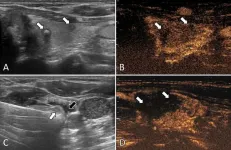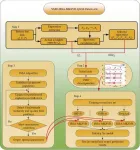(Press-News.org) Cells within the intestines perform various roles including nutrient absorption, sensing, and maintaining homeostasis. Certain chronic disorders are distinctly characterized by gut inflammation, which disrupts intestinal cells and can lead to a remodeling of the gut and the introduction of new immune cells. To better understand the types of cells and their positioning within the intestines, researchers at Brigham and Women’s Hospital, a founding member of the Mass General Brigham healthcare system, in collaboration with investigators at Boston Children’s Hospital, used a new technique known as MERFISH (multiplexed-error robust-fluorescence in situ hybridization) to analyze 940 genes in 1.35 million intestinal cells in a mouse model of colitis. They identified cell populations associated with healthy and inflamed states, mapped their spatial neighborhoods, and traced the evolution of these populations during the inflammation process. One significant cell type to note was fibroblasts, that, when in a distressed state, can induce inflammation associated fibroblasts (IAFs), which may help remodel extracellular matrixes, recruit immune cells, and produce inflammatory cytokines.
However, some key questions still remain, including the specific diversity of IAF populations, their precise tissue locations, and how they emerge during inflammation. Nevertheless, the researchers were able to generate a unique spatial atlas of a mouse colon both in a healthy state, and during intestinal inflammation, which has the potential to assist with therapeutic treatments for chronic inflammatory diseases. In previous studies, IAFs have been observed in a variety of diseases, including cancers and autoimmune diseases, so understanding the role and mechanisms of IAFs may help with the development of treatments for these other diseases.
“Our team wanted to better understand how cells are organized within the gut, and how inflammation can impact cellular interactions and communication at the tissue scale,” said senior author Roni Nowarski, PhD, of the Brigham’s Department of Neurology and Harvard Medical School’s Department of Immunology. “This work is particularly exciting and has given us a better understanding of the tissue context of cellular responses during inflammation, which we hope will help us design better therapeutics to fight serious chronic inflammatory diseases.”
The full article can be read in Cell.
Authorship: Co-authors of the paper include Paolo Cadinu, Kisha N. Sivanathan, Aditya Misra, Rosalind J. Xu,Davide Mangani, Evan Yang, JosephM. Rone, Katherine Tooley, YoonChul Kye, Lloyd Bod, Ludwig Geistlinger, Tyrone Lee, Noriaki Ono, Gang Wang, Liliana Sanmarco, Francisco J. Quintana, Ana C. Anderson, Vijay K. Kuchroo. Co-senior authors are Jeffrey R. Moffitt and Roni Nowarski.
Paper cited: Cadinu, P et al. “Charting the cellular biogeography in colitis reveals fibroblast trajectories and coordinated spatial remodeling”. Cell. DOI: 10.1101/2023.05.08.539701.
END
Gene analysis generates spatial map of intestinal cells and traces their trajectories during gut inflammation
A new study using spatial transcriptomics was able to chart cellular neighborhoods in the healthy and inflamed gut, as well as showcase the key role of fibroblasts in response to inflammation
2024-04-02
ELSE PRESS RELEASES FROM THIS DATE:
Gloom and doom warnings about climate change do not work
2024-04-02
If you want to spread a message about climate change and global warming, you need to adapt the message according to your intended audience and what you want to achieve.
Researchers have now developed an app to help people who want to spread their message on climate issues to ensure they generate the most support possible – be they researchers, politicians, various decision makers or legislators.
Huge survey involving 63 countries
59,000 people participated in surveys as part of the work on creating the app, and Norway was among ...
The 2024 Career Optimism Index® study highlights shift from the great resignation to a great talent stagnation – and how employers can break through
2024-04-02
Today the University of Phoenix Career Institute® released its 2024 Career Optimism Index®, a comprehensive study examining the state of American workers' career trajectories and sentiments about the future of their job and career opportunities. This year's Index, the fourth consecutive year it has been fielded, reveals that workers and employers are facing a critical moment of talent stagnation in the workplace.
More than half (53%) of Americans report feeling easily replaceable in their job position and 64% of workers say their company does not offer opportunities ...
Minimally invasive procedure may spare patients from thyroid surgery
2024-04-02
OAK BROOK, Ill. – In a 10-center study, microwave ablation offered progression free survival rates and fewer complications than surgery in the treatment of a form of thyroid cancer known as papillary thyroid carcinoma (PTC), according to research published today in Radiology, a journal of the Radiological Society of North America (RSNA).
The most common type of thyroid cancer, PTC often presents with multifocality, meaning that two or more bumps or nodules (papillae) are found within the thyroid gland. The occurrence of multifocality within PTC cases is notably frequent, ranging between approximately ...
Noted UCLA neurologist Dr. Rhonda Voskuhl wins 2024 John Dystel Prize for multiple sclerosis research
2024-04-02
[New York, April 2, 2024] – Rhonda Voskuhl, M.D., an internationally recognized neurologist and investigator at the University of California, Los Angeles, is the winner of the 2024 John Dystel Prize for Multiple Sclerosis Research. She is being recognized for her innovative research to understand mechanisms underlying sex differences in multiple sclerosis (MS) and advancing women’s health.
Women are much more susceptible than men to developing MS, an immune-mediated neurological disease. Voskuhl has conducted extensive basic and clinical research ...
Novel vaccine, PfSPZ-LARC2 Vaccine, to prevent malaria infection developed by Seattle Children’s Research Institute and Sanaria ready for human testing
2024-04-02
April 2, 2024 – In a report published on March 21, 2024 in EMBO Molecular Medicine (A replication competent Plasmodium falciparum parasite completely attenuated by dual gene deletion) investigators at Seattle Children’s Research Institute and Sanaria Inc. describe the development of a whole malaria parasite vaccine strain that infects the liver, develops to the late liver stage, and then gets completely stuck and cannot burst out of the liver to cause symptomatic blood infection. The creation of this strain called LARC2 (Late liver-stage Arresting, Replication Competent) was accomplished by deletion of only two parasite genes out of the approximately 5,000 in the ...
A hybrid data driven framework considering feature extraction for battery state of health estimation and remaining useful life prediction
2024-04-02
A paper proposing a hybrid data driven framework considering feature extraction for battery state of health estimation and remaining useful life prediction was published in the journal Green Energy and Intelligent Transportation on 29 March 2024.
VMD is used for completely non-recursive modal variation to deal with signals. The optimal solution of the variational problem is obtained finally by effective decomposition component of the given signal. By iteration, the VMD algorithm can decompose the signals into some intrinsic ...
Press passes available now for NUTRITION 2024 to be held June 29–July 2
2024-04-02
Complimentary press passes are now available for NUTRITION 2024, the annual flagship meeting of the American Society for Nutrition. Join us June 29–July 2 in Chicago for the latest developments in nutrition research, practice and policy.
As the pre-eminent meeting in nutrition science, NUTRITION attracts thousands of scientists, practitioners, policymakers, advocacy leaders and industry professionals each year. Reporters are invited to attend in person to connect with the field’s leaders and learn about exciting scientific ...
UMass Amherst-led team creates biofilm-resistant glass for marine environments
2024-04-02
AMHERST, Mass. – A group of researchers led by University of Massachusetts Amherst engineers have created ultraviolet (UV) rays-emitting glass that can reduce 98% of biofilm from growing on surfaces in underwater environments, as reported in the journal Biofilm.
Biofilm is a slimy layer of various types of microorganisms that grows on wet surfaces. “If you look down your sink and touch the inner side of it—that slimy substance is biofilm,” describes Mariana Lanzarini-Lopes, ...
Heart health declines rapidly after menopause
2024-04-02
A woman’s cardiovascular risk can rise sharply after she goes through menopause, quickly catching up to men of a similar age and health profile, according to new findings presented at the American College of Cardiology’s Annual Scientific Session. Researchers said the study underscores the importance of recognizing and addressing early warning signs of heart disease risk in women as they lose the protective effects of estrogen after menopause.
“This is a unique study cohort of only post-menopausal ...
Majority of people with heart disease consume too much sodium
2024-04-02
Individuals with heart disease stand to gain the most from a low-sodium diet but, on average, consume over twice the recommended daily sodium intake, according to a study being presented at the American College of Cardiology’s Annual Scientific Session.
Sodium is an essential nutrient, but consuming too much can raise blood pressure, which damages blood vessels and forces the heart to work harder. Excess sodium can also cause the body to retain fluid, exacerbating conditions like heart failure. The current U.S. Dietary Guidelines put out by the U.S. Department of Agriculture ...
LAST 30 PRESS RELEASES:
Yale study challenges notion that aging means decline, finds many older adults improve over time
Korean researchers enable early detection of brain disorders with a single drop of saliva!
Swipe right, but safer
Duke-NUS scientists identify more effective way to detect poultry viruses in live markets
Low-intensity treadmill exercise preconditioning mitigates post-stroke injury in mouse models
How moss helped solve a grave-robbing mystery
How much sleep do teens get? Six-seven hours.
Patients regain weight rapidly after stopping weight loss drugs – but still keep off a quarter of weight lost
GLP-1 diabetes drugs linked to reduced risk of addiction and substance-related death
Councils face industry legal threats for campaigns warning against wood burning stoves
GLP-1 medications get at the heart of addiction: study
Global trauma study highlights shared learning as interest in whole blood resurges
Almost a third of Gen Z men agree a wife should obey her husband
Trapping light on thermal photodetectors shatters speed records
New review highlights the future of tubular solid oxide fuel cells for clean energy systems
Pig farm ammonia pollution may indirectly accelerate climate warming, new study finds
Modified biochar helps compost retain nitrogen and build richer soil organic matter
First gene regulation clinical trials for epilepsy show promising results
Life-changing drug identified for children with rare epilepsy
Husker researchers collaborate to explore fear of spiders
Mayo Clinic researchers discover hidden brain map that may improve epilepsy care
NYCST announces Round 2 Awards for space technology projects
How the Dobbs decision and abortion restrictions changed where medical students apply to residency programs
Microwave frying can help lower oil content for healthier French fries
In MS, wearable sensors may help identify people at risk of worsening disability
Study: Football associated with nearly one in five brain injuries in youth sports
Machine-learning immune-system analysis study may hold clues to personalized medicine
A promising potential therapeutic strategy for Rett syndrome
How time changes impact public sentiment in the U.S.
Analysis of charred food in pot reveals that prehistoric Europeans had surprisingly complex cuisines
[Press-News.org] Gene analysis generates spatial map of intestinal cells and traces their trajectories during gut inflammationA new study using spatial transcriptomics was able to chart cellular neighborhoods in the healthy and inflamed gut, as well as showcase the key role of fibroblasts in response to inflammation




